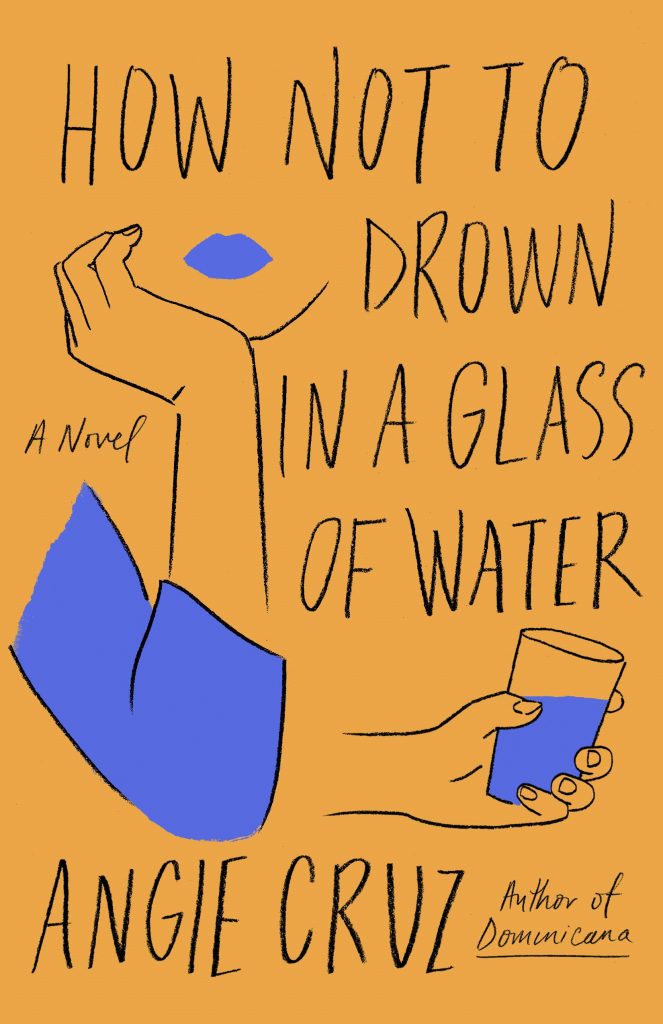Over a round of yerba mate is where I’ve heard the best storytellers. In these circles of trust, tongues and tales become tangible and ideas are formed. Before the written word came to lay claim of colonial histories around the world, this is how my ancestors passed on our truths in conversations as such. And precisely in this manner is how Angie Cruz’s fourth novel How Not To Drown In a Glass of Water speaks to us. The title’s even a clue. One that gringos may miss. In Latin America we use an expression that reminds us not to sweat small stuff. But of course, we don’t say it that way, instead we tell you, ‘No te ahogues en un vaso de agua’ which directly translates to, ‘Don’t drown in a glass of water’. And usually, 99.999 per cent of the time when you’re warned by members of our community by this idiom it’s because you’ve just desahogarte with them. Which the chatty protagonist of Cruz’s latest novel, Cara Romero, perfectly translates as, “Desahogar: to undrown, to cry until you don’t need to cry no more.”
Within the book, Cara undrowns her entire life story and knowledge in a mere six hours. The vignette-like capture of time through documents alongside the use of second-person monologue is skilfully done; “But listen. This is what I wanted to tell you today. Look, look at this. Like my life needs more problems. The management gave me this paper. Read it. They say if I don’t pay the rent I owe, they will throw me out of the building.” Through this narrative-breaking structure readers get a full insight as to what it’s like to live on ‘Obama checks’ (cheques) as a Dominican migrant woman in her mid-50s, whilst living in an apartment in Washington Heights during the Great Recession of 2009.
This poignant and specific tale got me thinking about my hometown in south-west Sydney, Fairfield, where a large part of the Latinx community reside and the unemployment rate is currently at 10.6 per cent. Three times that of the national unemployment rate of 3.5 per cent! In Cara’s misfortunes, I see mi gente on Barbara Street queuing up at Centrelink for hours—something I’ve done myself on more than one occasion—desperate to work and angry at a system that fails us. Because our names are too long on our resumes. Because our public transport is unreliable. Because our mother tongue has marked her rolling r’s on us.
With seamless codeswitching from English to Spanish, we continue to listen to Cara and her tales because she feels like a living breathing person standing before us. Why do I say listen instead of read? Well, because the author brilliantly crafts each sentence to sound like the madres, tías, vecinas and co-madres of our Latinx community which she dedicates this blood and bone of a book to. Dr. Janine M. Schall explains in World of Words (The University of Arizona) that, “Codeswitching is a purposeful literary device that can serve a number of different purposes. If the author wants to tell a story about a particular group of people, such as Latinos in the borderland, codeswitching can be a natural and authentic way to establish characters and setting.” And although this novel is not set at the border, it does speak to the large Dominican immigrants that settled in Washington Heights. “Codeswitching often signals a more casual register and offers the author to play with language. Sometimes, too, concepts work better in one language than the other.” In this way, when Cruz codeswitches between languages, she sets the novel in a tongue that’s recognisable by those from its diaspora. “What age do you have?” Cara asks her career advisor, which is how Latinx people literally enquire about someone’s age in Spanish. When reading dialogue like this, I felt like a child again, walking through Ware Street for Thursday night shopping and then quickly stopping at La Torre Cake Shop on Nelson Street – the Latinx bakery that I now take my children to years later.
Moreover, what I love about this novel is how Cruz amplifies the importance of community, especially through Cara’s care of her ninety-year-old neighbour, La Vieja Caridad. If it wasn’t for Cara’s tending of the old woman’s mandados at the bodega to cooking homely dinners of “the moro with habichuelas negras, the plátanos, and the salad of aguacate”, La Vieja Caridad would live alone, in filth and emptiness. This kind of solidarity is one I also recognise. In my tía, Jenny, who always helps with cleaning and cooking for her friends and family without them asking her to. My prima, Tania, immediately begins to knit booties and beanies at the news of any baby on the way. My husband, Gerard, has tiled, painted and plastered an extensive number of relative’s homes in exchange for a round of yerba mate.
Finally, what this novel has done exceptionally is explore Latinx parenting over the generations and how it has changed. From Cara’s parents who, “If we looked to them wrong, cocotazo. If we cried from the cocotazo, another cocotazo.” The novel compares this outdated strict and violent parenting style with that of Cara’s fifteen years younger sister, Ángela. Ángela uses a behaviour management plan with her children that offers choices and praise for positive behaviour. As I listened to Cara examine and critique both her mother and her younger sister, I could hear the common debates we have about parenting between my mother and my sister. From to co-sleep or not. Through to the taboo of smacking.
How Not To Drown In a Glass of Water is a masterful exploration of our Latinx community. Through Cara’s witty tongue she punctuates their value as migrants in western culture, transcending space and time. From vignette to codeswitching to second-person narration, the Latinx diaspora from the United States of America (Washington Heights, New York) to Australia (Fairfield, south-west Sydney) is drawn ever closer.
How Not to Drown in a Glass of Water was release 13 September 2022. You can follow the author on Instagram: @writercruz and Twitter: @acruzwriter and you can buy her books on angiecruz.com/books
Book review first published in Mascara Literary Magazine on 7 October 2022. Commissioned by Diversity Arts Australia for the StoryCasters project.

